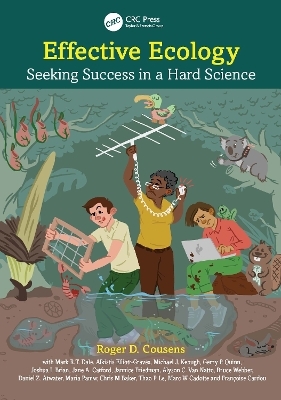
Effective Ecology
CRC Press (Verlag)
978-1-032-32292-6 (ISBN)
Ecology is one of the most challenging of sciences, with unambiguous knowledge much harder to achieve than it might seem. But it is also one of the most important sciences for the future health of our planet. It is vital that our efforts are as effective as possible at achieving our desired outcomes. This book is intended to help individual ecologists to develop a better vision for their ecology – and the way they can best contribute to science.
The central premise is that to advance ecology effectively as a discipline, ecologists need to be able to establish conclusive answers to key questions rather than merely proposing plausible explanations for mundane observations. Ecologists need clear and honest understanding of how we have come to do things the way we do them now, the limitations of our approaches, our goals for the future and how we may need to change our approaches if we are to maintain or enhance our relevance and credibility. Readers are taken through examples to show what a critical appraisal can reveal and how this approach can benefit ecology if it is applied more routinely.
Ecological systems are notable for their complexity and their variability. Ecology is, as indicated by the title of this book, a truly difficult science. Ecologists have achieved a great deal, but they can do better. This book aims to encourage early-career researchers to be realistic about their expectations: to question everything, not to take everything for granted, and to make up their own minds.
The primary author and coordinator of the project is Roger D. Cousens, an Emeritus Professor at The University of Melbourne, Australia with over 40 years specialising in agricultural weeds and invasive species. His approaches have featured strong components of field research, population modelling and statistical analysis, while he has initiated collaborative projects with quantitative geneticists, molecular ecologists, geomorphologists and social scientists. For the last decade his passion has been unravelling the dynamics of two invasive sea-rockets, their hybridisation and the role of their pollinators. Throughout his career, he has been an outspoken communicator on research practices. This book is a direct outcome of his 12 years as the convenor of the Andina international workshops, developing approaches to effective debate and in which the role of early-career researchers has been central. He has been lead author on two previous academic books: Population Dynamics of Weeds (Cambridge University Press, 1995 with Martin Mortimer); and Dispersal in Plants: A Population Perspective (Oxford University Press, 2008 with Calvin Dytham and Richard Law). He is an Honorary Fellow of the Weed Science Society of America.
1. Why a hard science needs strong critique 2. The evolution of ecology 3. What sort of a science is ecology? 4. Rigorous ecology needs rigorous statistics 5. Ecological scale and context dependence 6. Assembling the ecological puzzle 7. Respecting the known unknowns 8. Theory, prediction and application 9. From pattern to process in the search for generality 10. Effective ecology
| Erscheinungsdatum | 23.08.2023 |
|---|---|
| Zusatzinfo | 1 Tables, black and white; 8 Line drawings, color; 14 Line drawings, black and white; 3 Halftones, color; 1 Halftones, black and white; 11 Illustrations, color; 15 Illustrations, black and white |
| Verlagsort | London |
| Sprache | englisch |
| Maße | 178 x 254 mm |
| Gewicht | 453 g |
| Themenwelt | Naturwissenschaften ► Biologie ► Botanik |
| Naturwissenschaften ► Biologie ► Ökologie / Naturschutz | |
| Technik ► Umwelttechnik / Biotechnologie | |
| Weitere Fachgebiete ► Land- / Forstwirtschaft / Fischerei | |
| ISBN-10 | 1-032-32292-6 / 1032322926 |
| ISBN-13 | 978-1-032-32292-6 / 9781032322926 |
| Zustand | Neuware |
| Informationen gemäß Produktsicherheitsverordnung (GPSR) | |
| Haben Sie eine Frage zum Produkt? |
aus dem Bereich


